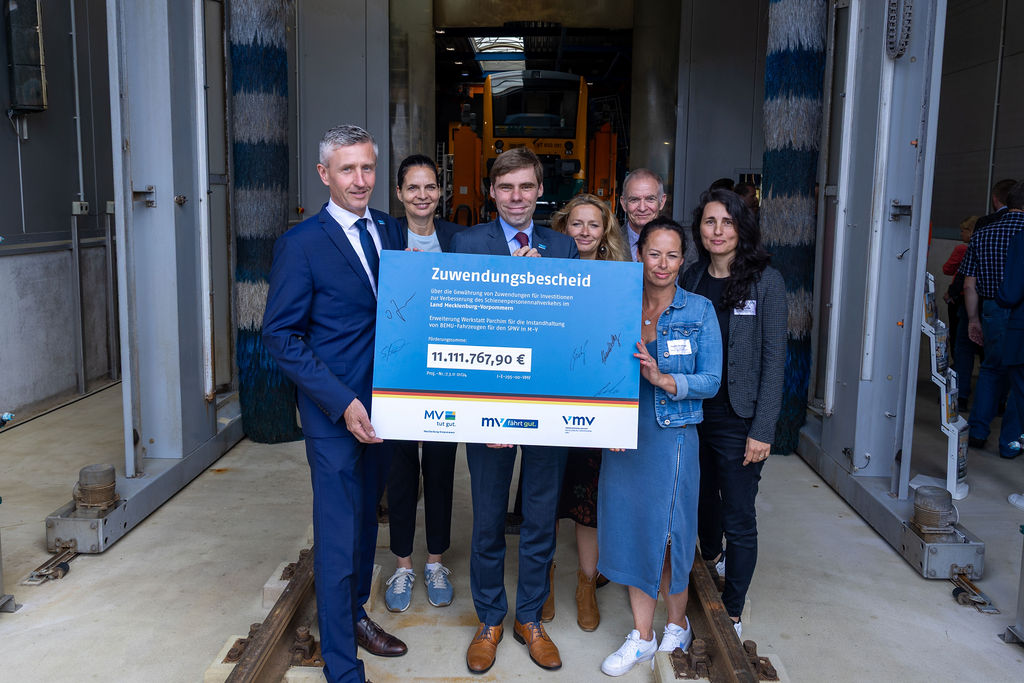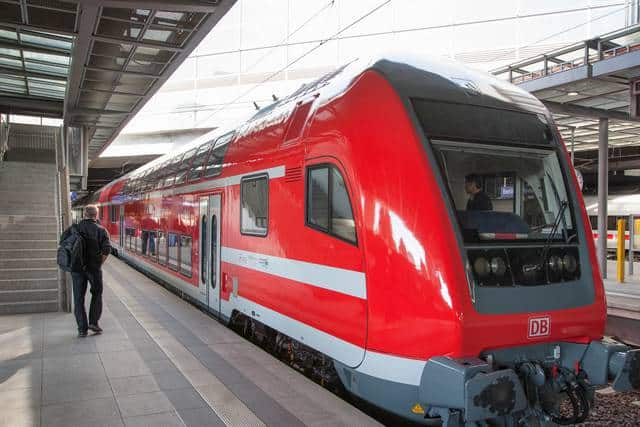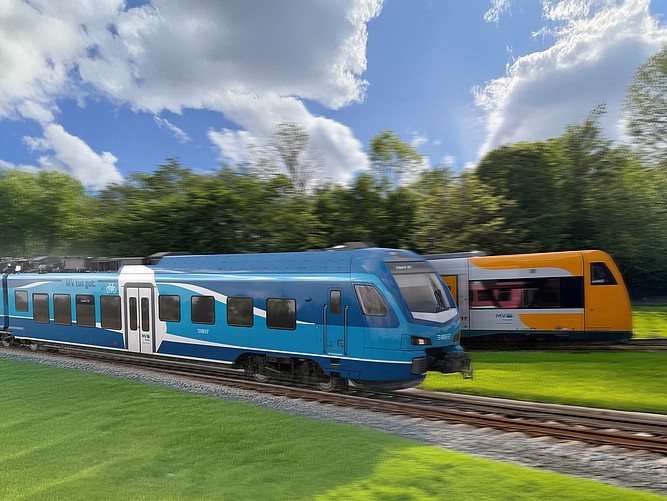More services and an attractive half-hourly service
On the way to the transport turnaround, the public transport authorities are aggressively preparing to strengthen rail with the award of the North-South Network.
A number of extensions to the existing services have now been secured. The North-South Network contract covers the RE3, RE4 and RE5 lines. The services include a total of approx. 11.6 million train kilometres per year. Overall, the service will be expanded on many sections. This concerns in particular the so-called Anhalter Bahn between Berlin and Jüterbog as well as to Lutherstadt Wittenberg and Falkenberg (Elster), the Lehrter Bahn to Rathenow and Stendal as well as the lines from Berlin to Rostock and Stralsund.
Guido Beermann, Minister of Transport of the State of Brandenburg: "The tender for the North-South Network is a remarkable milestone towards more rail, especially for rural areas. Especially for commuters and tourists, NOS offers attractive improvements for passengers through more seats and more bicycle capacities in all trains. With this and the other tenders, we are taking another step towards sustainability and innovation. In this way, we want to inspire the citizens for local rail passenger transport. And in this way we are advancing the transport turnaround and climate protection."
Bettina Jarasch, Senator for the Environment, Mobility, Consumer and Climate Protection of the State of Berlin: "We continue to put our faith in rail - and more and more people are taking to it: The new North-South network will bring a noticeable quality leap in regional transport, on the popular routes from Berlin towards the Baltic Sea, but also to the west and southwest of Brandenburg and beyond. Commuters in particular will benefit from increased frequency, more comfortable and longer trains. And holiday trips directly from the station will become much more relaxed - one more reason to use the train instead of the car. Together with the significant improvements on the Elbe-Spree network, the state of Berlin will spend about 20 million euros more per year on regional transport from 2023 onwards - an increase of about a quarter. This is a big piece of mobility turnaround for our region."
Reinhard Meyer, Minister of Economic Affairs, Infrastructure, Tourism and Labour of the State of Mecklenburg-Vorpommern: "With the new North-South network, tourist Baltic Sea transport will be significantly strengthened. Modern vehicles and more capacity will ensure a more relaxed journey to and from the sea or the Lake District. At the same time, there will also be more comfort for regular commuters. It is particularly important that Neubrandenburg has been successfully connected even better to Berlin and Stralsund. With the continuous hourly service on the RE 5 between Neustrelitz and Stralsund and the planned barrier-free expansion of the stations on this axis by DB Station&Service, we are strengthening the connection of the eastern part of the state."
Dr Lydia Hüskens, Minister for Infrastructure and Digital Affairs of Saxony-Anhalt: "Mobility means freedom. Freedom also includes a real choice of means of transport. For this, attractive offers are needed. More space in the trains for passengers and bicycles, greater comfort, shorter journey times and a denser frequency - these are precisely the signals we want to send. Only in this way can we succeed in making local transport more attractive for commuters, excursionists and occasional travellers, and in making people permanently enthusiastic about the railway as a means of transport. With the North-South Network, we are coming a great deal closer to our goal of serving all routes to Berlin at hourly intervals in the future, because with the start of the contract in December 2026, the German capital will also be accessible by local transport every hour from Lutherstadt Wittenberg on Mondays to Fridays. The two-hourly direct connection from Stendal is also a first significant improvement."
Thomas Dill, Head of the Centre for Local Transport and Quality Management at Verkehrsverbund Berlin-Brandenburg (VBB): "After the successful award procedures for the Elbe-Spree network, the Lausitz network and the East Brandenburg network, we are now continuing our efforts for more offers and more quality on the railways in the North-South network. Quality standards in the VBB and overall more modal shift to rail - the VBB takes the transport turnaround seriously and also implements the measures necessary for this!"
The North-South network and its improved service in detail:
On the so-called Hitchhiker's railway (Berlin - Ludwigsfelde - Luckenwalde - Jüterbog - Lutherstadt Wittenberg/ Falkenberg (Elster)) the lines RE3, RE4 and in future also the line RE5 continue to travel together.
From December 2026, the RE3 line will run from Berlin to Lutherstadt Wittenberg every hour from Monday to Friday, with all trains continuing to run every two hours at weekends. On Friday/Saturday and Saturday/Sunday nights, there will continue to be a direct connection from/to Halle (Saale).
In future, the RE4 line will run hourly to Falkenberg (Elster) every day. Between Jüterbog and Berlin, both lines will complement each other to two trains per hour and direction all day, seven days a week.
Since even more long-distance trains are to travel on the line in the future, the stop and line concept in the north-south network must be structured differently. The RE3 will then stop every hour at all stations between Lutherstadt Wittenberg, Jüterbog and Berlin. In return, the RE4 will be accelerated from Jüterbog and will only stop in Luckenwalde, Ludwigsfelde, Berlin Lichterfelde Ost and Berlin Südkreuz.
For the stations further away from Berlin, this will result in noticeable travel time reductions. For example, the journey time between the district town of Herzberg (Elster) and Berlin is reduced by about 15 minutes in some cases.
On the route from Falkenberg (Elster) to Jüterbog, the intermediate stops are served by all trains of the RE4 and thus every hour.
Lehrter Bahn (Berlin - Rathenow - Stendal)
At the start of the new north-south network, the RE4 line will initially run every two hours from Berlin beyond Rathenow to Stendal. It will thus supplement the RB34 line, which also runs every two hours, to form a total hourly service from the end of December 2026. After completion of the continuous electrification of the main line in the Rathenow - Stendal section, the RE4 trains will then run every hour from Berlin beyond Rathenow to Stendal and thus take over the services of the existing RB34.
The service between Berlin and Rathenow is also being expanded. At peak times, additional trains will run between Berlin and the Havel city. There will then be a total of two trains per hour on this section of the line every day at times of particular demand - specifically from around 5am to 8am in the morning and from 3pm to 8pm in the afternoon.
Berlin - Eberswalde - Stralsund or Schwedt andBerlin - Neustrelitz - Rostock or Stralsund
The service will also be expanded on the routes to the north. During peak tourist periods in the summer, services between Rostock and Neustrelitz will be increased in order to connect the tourist regions of the Lake District and the Baltic Sea coast more frequently. Additional excursion trains - as currently used on seasonal weekends between Berlin and Stralsund - are also still planned. The seasonal trains in the direction of Neustrelitz and Prenzlau can also continue to be implemented flexibly via options in the transport contract.
In the weekday rush hour, additional relief trains between Neubrandenburg and Berlin as well as additional early and late connections between Neustrelitz and Rostock are planned. On the Stralsund - Neubrandenburg - Neustrelitz - Berlin axis, the evening and late-night services will be improved. Between Neustrelitz and Stralsund, the hourly frequency will also be extended to weekend days.
Vehicles
On the north-south network, double-deck trains are always operated with Higher capacities deployed. The future vehicle requirement comprises a total of approx. 40 train sets, which are now generally used all year round. At least 500 seats offer. This means that outside the summer season up to 20 % more seats will be available compared to the trains currently in use. In view of the strong demand on the Berlin - Eberswalde - Angermünde section and in excursion traffic, the seating capacities on the RE3 line will be increased significantly beyond this. As early as December 2026, the trains will run with a greatly expanded capacity of almost 580 seats, instead of the current 420 or 500, depending on the season.
In the long term, it is planned to expand the infrastructure here during peak times, Trains with up to 780 seats will be used. Because of the importance of all lines for excursion traffic, at least 72 Bicycle parking The RE3 line offers 84 seats per train. Of these, at least 24 are not restricted by folding seats, which are also clearly marked accordingly.
In the new North-South network, new vehicles will be used for the RE3 line and the domestic services in Mecklenburg-Vorpommern between Neustrelitz and Stralsund, as well as used double-deck vehicles for the other services of the RE5 and for the RE4 line. The used vehicles are subjected to a extensive redesign and will be given a new, modern exterior and interior appearance. A total of 12 five-car double-decker new vehicles of the type Stadler KISS will be used for the RE3 line, and three single-decker four-car new vehicles of the type Stadler FLIRT XL will be used for the RE5 in inland traffic in Mecklenburg-Vorpommern.
The redesigned double-decker trains carry five carriages with 503 seats and 72 bicycle stands on the RE4 and RE5 lines all year round. The new vehicles have a capacity of 579 (RE3) and 275 (RE5 in domestic traffic in Mecklenburg-Vorpommern) seats.
In the long term, the number of seats in the trains on the Prenzlau or Schwedt (Oder) - Berlin section can be up to 780 be increased. For this purpose, additional three-car single-deck FLIRT XLs will be optionally procured during the term of the contract and run coupled with the KISS trains. The feasibility of the platform extensions required for implementation is being examined together with DB Station&Service AG, among others.
Quality
The High set quality standards of the public transport authorities are now also coming to fruition in the new North-South network. Smart vehicles" will be used throughout. These modern trains can be equipped with a Continuous vehicle diagnostics quickly diagnose and report damage to or in the vehicle (doors, WC, air conditioning, sockets, etc.). The vehicles in the North-South network are much improved in terms of quality, especially in the passenger compartment. It is free wifi plus a dynamic information portal that can be used for mobile devices with Utilisation display be available via app. Modern butterfly tables are also available in 2nd class. In the new vehicles, charging will be possible via additional USB-C sockets as well as via inductive charging at the tables. Last but not least, the technically up-to-date Toilet facilities with an appealing interior and with a high quality, new vandalism protection.
You can obtain an overview of the route network for the North-South network from here.






